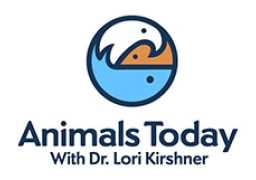CAMPAIGN & PROJECTS
Homeless Pets, Overbreeding And Related Legal Issues OLD
A decade ago, it seemed that we were on the verge of solving the problem of unwanted adoptable dogs and cats in the US, and with it the euthanasia of healthy animals. Alas, despite good progress due to the massive efforts of many animal organizations and individual pet lovers, thet goal still is frustratingly elusive. However, AIA remains committed to the cause of saving lives with our focus on pet adoptions, low cost and no cost spay and neuter programs, opposing the purposeful breeding of dogs and cats and the organizations which promote the industry (e.g. the AKC, private breeders and puppy mills), and fighting laws and ordinances which discriminate against certain dog breeds.
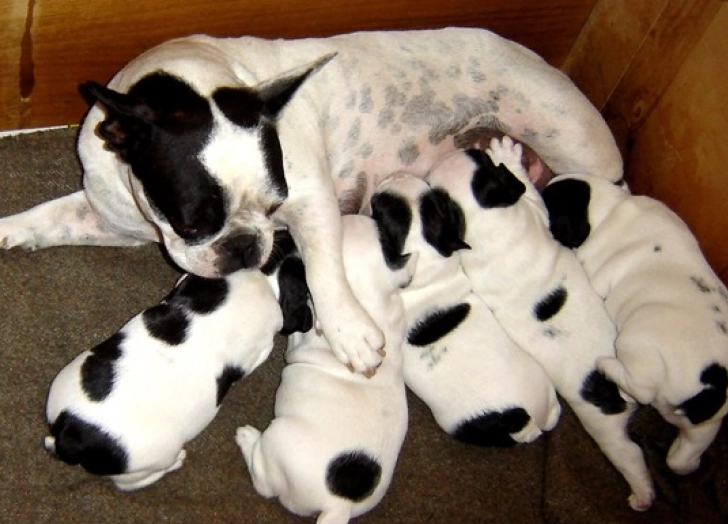
Join Us for Puppy Mill Awareness Day
It is Puppy Mill Awareness Day: September 20, 2025
Dear Friends,
Every year, millions of dogs suffer in puppy mills – commercial breeding operations that prioritize profit over animal welfare. As we approach Puppy Mill Awareness Day on September 20, 2025, we invite you to join us in shining a light on the harsh realities of these facilities and taking action to end the cycle of cruelty. Together, we can make a difference by choosing adoption over buying and advocating for stronger protections for dogs.
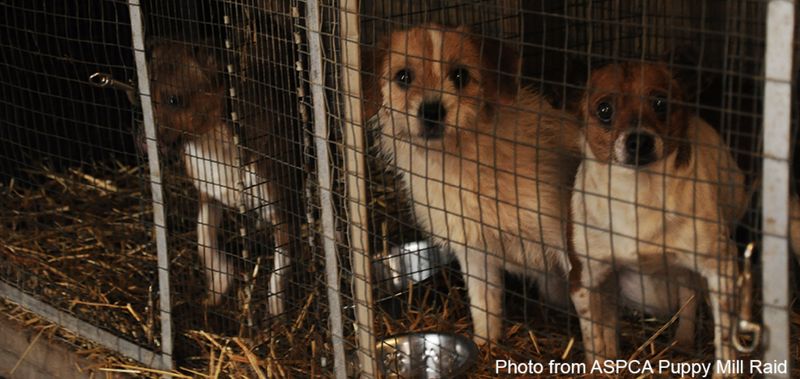
The Harsh Reality of Puppy Mills
Puppy mills are large-scale breeding operations where dogs are treated as commodities, not companions. Breeding dogs are confined to cramped, filthy cages, often stacked in poorly ventilated barns or sheds. They receive minimal food, water, or veterinary care, and are bred repeatedly without rest, leading to severe physical and emotional tolls. Puppies are typically separated from their mothers too early, shipped to pet stores or sold online, often without proper vaccinations or socialization.
Conditions in Puppy Mills Include:
- Unsanitary Environments: Dogs live in cages caked with feces, urine, and filth, leading to infections and parasites.
- Overcrowding: Multiple dogs are crammed into small spaces, with little room to move or exercise.
- Neglect: Lack of grooming, dental care, and medical attention results in untreated injuries and chronic health issues.
- Poor Nutrition: Dogs are often fed low-quality food, leading to malnutrition and weakened immune systems.
Physical and Psychological Consequences
The toll of puppy mill life is devastating for both breeding dogs and their puppies.
Breeding Dogs Suffer From:
- Physical Health Issues: Severe dental disease, skin infections, respiratory problems, and musculoskeletal disorders from confinement. Overbreeding leads to uterine infections, mastitis, and birthing complications.
- Psychological Trauma: Constant confinement and lack of human interaction cause anxiety, fear, and depression. Many dogs become withdrawn or aggressive due to prolonged neglect.
Puppies Face:
- Genetic Disorders: Inbreeding and lack of genetic screening result in congenital issues like hip dysplasia, heart defects, or neurological conditions.
- Infectious Diseases: Parvovirus, distemper, and kennel cough are rampant due to unsanitary conditions and lack of vaccinations.
- Behavioral Challenges: Early separation and lack of socialization can lead to fearfulness, aggression, or difficulty bonding with humans.
These dogs deserve better – a life filled with love, care, and freedom.
Why Adoption Matters:
When you choose to adopt from a shelter or rescue, you’re giving a second chance to a dog in need, many of whom have escaped the horrors of puppy mills. Adoption also reduces demand for puppy mill dogs sold in pet stores or online, helping to break the cycle of cruelty. Every adopted pet is a step toward shutting down these inhumane operations.
Adoption Benefits:
- Saving Lives: Shelters are full of loving dogs, including purebreds and puppies, waiting for forever homes.
- Health and Behavior Support: Reputable shelters provide vaccinations, spaying/neutering, and behavioral assessments to ensure a good match.
- Cost-Effective: Adoption fees are often lower than purchasing from breeders or pet stores, and you’re supporting a worthy cause.
Action Items to Curtail Puppy Mills
This Puppy Mill Awareness Day, take a stand against puppy mills with these actionable steps:
- Adopt, Don’t Shop: Visit your local shelter or rescue organization to find your next dog or cat!
- If you must have a purebred animal, remember approximately 15% of animals in shelters are purebred. Also, there are ethical rescue groups that specialize in every imaginable breed of dogs and cats, so seek them out!
- Report Suspected Puppy Mills: If you suspect a breeding operation is neglecting animals, report it to your local animal control or the ASPCA’s cruelty hotline
(1-800-582-5979). - Donate or Volunteer: Support local shelters with donations or volunteer to help!
Did You Know?
- Established in 2004 in Lancaster, Pennsylvania, Puppy Mill Awareness Day takes place annually on the third Saturday of September.
- Listen to Lori’s discussion about puppy mills on Animals Today Radio. It begins at 22:00.
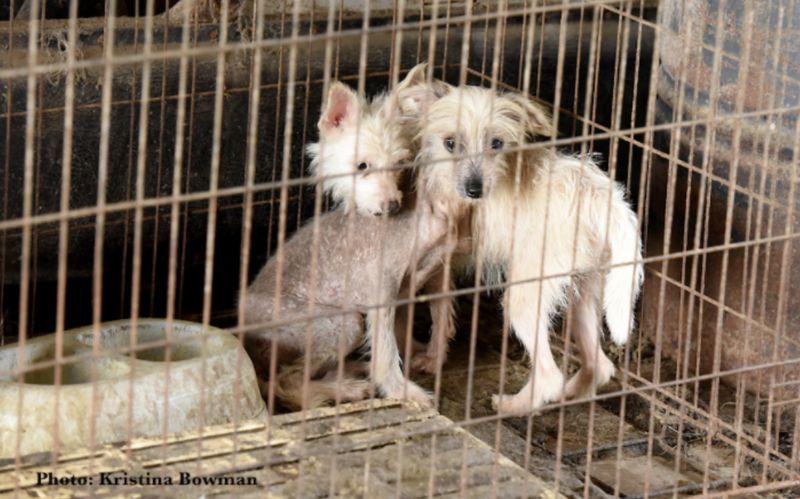
From the Streets to Our Hearts: The Mission of Adopting, NOT Shopping
by Camille Akers
If you’re on dog Instagram (“dogstagram”), just scrolling on your explore page, or maybe a fan of Barstool Sports, chances are you’ve heard of Miss Peaches. Famous, commercial actress, and multi-home owner, Miss Peaches… is just a cute rescue dog!

Instagram: @famousmisspeaches
This sweet girl and her “papa” (David Portnoy) are going viral for their sweet relationship and for spreading awareness on backyard breeding, adopting instead of shopping, and offering a helping hand to pets who have gone through rough patches. Before finding her forever home, Miss Peaches was rescued from a backyard breeder and animal hoarder.
Miss Peaches has stolen the hearts of animal lovers across the globe, for her adorable face and her new, luxury life. Her instagram account has inspired many to look into the crises pet’s face regarding finding the right homes: homeless pets, lost pets, and victims of backyard breeding all face distress, and it is our job to change their lives, like Dave and Miss Peaches.
Backyard Breeding
While Miss Peaches’ adoption journey has opened doors to pet adoption recognition and donations through her clothing (I must admit- I have the Miss Peaches face tee) and Georgia peach merch, a humble adoption story will always save a homeless pet’s life.
According to the Humane Society, roughly 70 million pets are homeless, including the 6 million shelter animals looking for their forever homes. Buying your pets from breeders like backyard breeders and puppy mills, that focus on pumping out specific animals over their health and care, not only influences more sick and miserable animals to be bred, but removes the spotlight from these homeless, shelter animals.
It is a misconception that you can’t find anything but a mutt in a shelter, with 25% of shelter dogs being purebred. In fact, my shelter dog is a purebred American Pit Bull Terrier.
If you know you want a purebred dog, or a specific breed of dog has always been your favorite, there are purebred and breed specific rescues out there! You can search for breed specific rescues on PetFinder or look at the social media pages of your local shelter, as they will often make posts of their most recent shelter residents.

Camille Akers: Lola the Purebred Pitbull
Dr. Lori Kirshner puts it simply on Animals Today Radio: breeders view the lives of these animals as a business. “Responsible breeder. That’s an oxymoron. They don’t love dogs. They know exactly how they are harming our dogs by their breeding practices, and if they truly love dogs, they wouldn’t be harming them” (Kirshner).
Putting the dogs’ breed over their health and safety is thoughtless, and understanding the consequences of where your dog comes from can help you avoid that. The example Kirshner uses is pugs: “Pugs are at risk for hip dysplasia as well as von Willebrand disease, which is a genetic bleeding disorder caused by low levels of clotting protein in the blood. Pugs also have a risk of getting pug dog encephalitis, also known as PDE, which is a fatal inflammatory brain disease that is unique to pugs” (Kirshner).
Keep kissing your wrinkly, cute pugs, but it is possible and necessary to do so without supporting a breeder that sets aside the dog’s future diseases in order to get a check. If you’re interested in listening to the podcast, click here: Animals Today Radio Archive.
Adopt, Don’t Shop
A phrase popularized in the ‘80s by animal rights activists in California, it highlights the importance of adopting animals from shelters rather than supporting unethical breeding practices potential in private breeders in pet stores. Embarking on an adoption journey is the first thing that comes to mind when hearing about adopting over shopping, but there are many other ways to support shelter animals, such as fostering, volunteering, and donating.
When you foster pets, a shelter animal will live in your home until a permanent home is found for them. Fostering pets is a great option for people who have the resources and determination to help one-on-one with a shelter animal, but are not ready or unable to adopt. Not only will this provide the pet somewhere cozy to live and a daily pal, but provides much needed socialization that will help prepare the pet for their future home. You can and should teach you foster dog commands like “sit” and “stay” and make sure your foster cat is comfortable using the litter box and behaving correctly within your lifestyle.
In order to get into fostering, you must submit an application to a foster program at your local animal shelter or rescue, which most offer. You will most likely provide documentation and be asked to conduct an interview, though there is no doubt the entire process will be worth it!
Doing research on your local animal shelters, you will find they are often looking for volunteers to assist with taking care of the animals and adding joy to the animals’ day! While walking a shelter dog, cleaning up after the shelter animals, or grooming the pets will not alone relieve the stress of the workers dedicated to finding homes for these pets, those actions will give those sweeties much needed tender love and care.
If you specifically want to see animals off to new homes, volunteer your time at pet adoption events. These events require lots of planning, marketing and skilled workers in order to be successful, and yet they could change a pet’s life! (My adoption event dog is sitting on my lap as I’m writing this).
Since the pandemic, the number of animals seeking home in shelters has increased, while adoption rates have not. In 2023, according to the national database Shelter Animals Count, shelter populations have grown by a quarter-million. With this increase in animals, not only is it more important than ever to stay informed, but there are hundreds of pets you can volunteer to help and socialize with. Unfortunately, as comes with overpopulation, euthanasia rates are unacceptably high, with 8.5% of shelter animals being euthanized in 2023. This is often due to a lack of resources or health issues presented in animals. Donating to your local animal shelter is a major way to help combat these problems, and you can always donate physical items instead of participating in monetary donations. Oftentimes, shelters need materials such as: pet beds, food, toys, bathing products, and sometimes your local shelter will post a wish list on their website! National companies are an option, but supporting your local shelter will guarantee help to pets and overall help the pet community within your area.

pexels.com
Lost Pets
If you find a homeless animal, understanding the best procedures can save the animal’s life and lead them to their forever home!
- Safely gain possession of the animal: if you ever feel that the animal presents a danger, call the police or animal control
- Check if the animal is wearing a collar or microchipped, and if they are, contact the owner to get the pet or get them scanned so they can get back home. It is important to check for the difference between lost, owned animals and homeless animals the need to be brought to shelters
- If the animal has no identification, bring them to the shelter, so they can be reunited with any potential owners or find a new home
- If you have the time, make posters or post online that you found a lost pet, in case they do have an owner. Using a platform like Nextdoor, a social media website specifically for neighborhoods, can help notify you on lost animals in your area and which homes they belong to
Shelters, although not uniformly ideal, provide safe housing, medical care, and rehabilitation these helpless animals would not be able to find on the streets. In 2023, 2.6 million shelter cats and 2.2 million shelter dogs were adopted. By stepping up, you could add another animal to this list.
Our dazzling dogs and cats provide unconditional love, companionship, and a unique type of happiness, enriching our lives in countless ways. The act of caring for a pet instills a sense of responsibility and empathy, encouraging us to be more attentive and nurturing. Pets improve our daily lives and offer us a sense of purpose. By caring for pets, we not only enhance their lives but also profoundly enhance our own.
Unfortunately, we live in a world where people try to exploit those who cannot speak and our desire to care for pets, so it is important to stay informed in order to make the best decisions for your animal and all the other animals looking for homes. As long as you are loving a pet with genuine devotion, thinking of ways to offer support in this time of crisis, and spreading awareness, you are helping. Your love and loyalty to pets is one of my most important parts of the process, and one of the best ways to stay confident that you are indeed helping as many animals as possible.
Who knows, maybe your support will help a pet like Miss Peaches get spoiled the way they deserve.
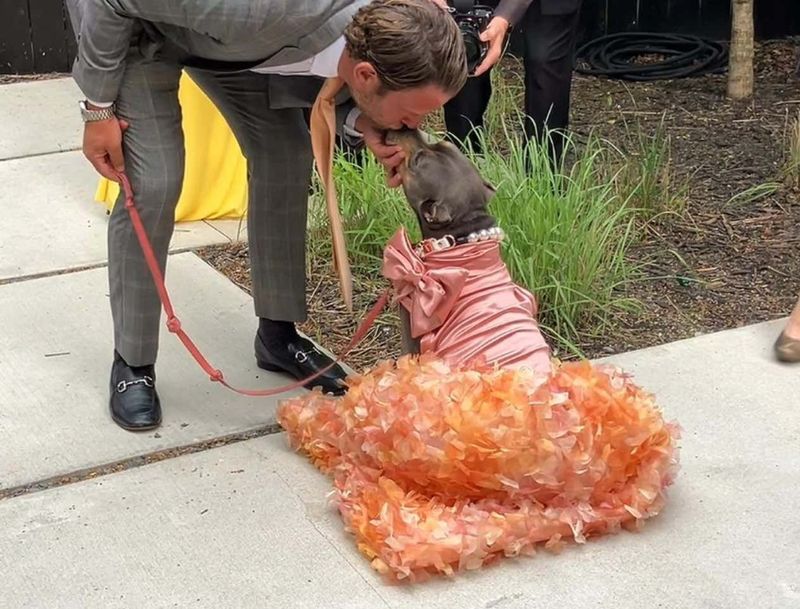
X: @barstoolsports
Animals Today September 27, 2022. Ethical and practical considerations of breeding dogs. This AP level animal quiz has teachers crying.
Lori begins with a detailed exploration into the ethics of dog breeding. The purebred dog industry not only creates innumerable animals with genetic defects, causing dogs to have a lifetime of medical problems and diseases, but also interferes with the adoption of healthy dogs confined in shelters by enticing people to buy from breeders instead of adopting.
Because of selective breeding (and even inbreeding) many purebred dogs develop conditions such as cancer, hip dysplasia, heart problems, epilepsy, and early onset cataracts.Lori contends three parties are responsible for the regrettable popularity of purebreds: the American Kennel Club (AKC), the breeders and the dog buyers.
The AKC sets the standards and promotes purebred dogs as superior and preferable to mixed breed dogs despite breed specific genetic defects. Breeders and puppy mills provide an endless supply of dogs, taking little responsibility for the health problems in dogs they create, and caring not about pet overpopulation. Buyers should know better but permit the industry to mold their beliefs.
The solution is to adopt and not to buy, and to avoid supporting breeders and the AKC.
Finally, do you remember Santa’s Little Helper, Speedy Gonzales, and Huckleberry Hound? Do you know what a formicarian is? Or, define fimbriae? Take Lori’s dastardly quiz and prove your mettle.

Animals Today November 18, 2023. Hot news! The miraculous microchip. The Mexican rescue, Isla Animals is building a new home and you can help! Helping community cats in the cold weather.
Peter begins with hot news items including a mass bird killing at Chicago’s McCormick Place, Gavin Newsom signs a fur sale ban in California, a 17’ 2” Burmese python was captured and killed in the Everglades, hero dog in Lebanon saves dumped newborn human, and we say farewell to friend of animals Bob Barker.
Lori then talks about the amazing technology of microchips, and their immense value.
Peter then welcomes a special guest Alison Sawyer, Founder of the rescue Isla Animals, in Mexico. Isla Animals is an established dog and cat rescue, providing free or reduced cost veterinary services, vaccines and medicines, offering free and low cost spay/ neuter clinics, rescuing and rehoming stray animals and offering animals for adoption. Based on Isla Mujeres for more than 20 years, they have been forced to relocate. Isla Animals is building a new home in nearby Cancun, and construction is underway! Peter speaks with its founder, Alison Sawyer about the joys and challenges of doing animal rescue in Mexico. Make sure to check out their GoFundMe page to see update on construction ways you can help get it completed. It is very exciting because with this larger, custom built clinic, they will be able to provide even more services! Isla Animals relies on all of us to do their vital work and, and rest assured that donations go a long way under its direction. Also, all of the proceeds of Alison’s book, The Dog Lady of Mexico go to the non-profit.
We conclude with a fact-filled discussion with Molly Armus, former staff attorney at Alley Cat Allies, who offers useful tips on making harsh winters a bit easier on community cats.
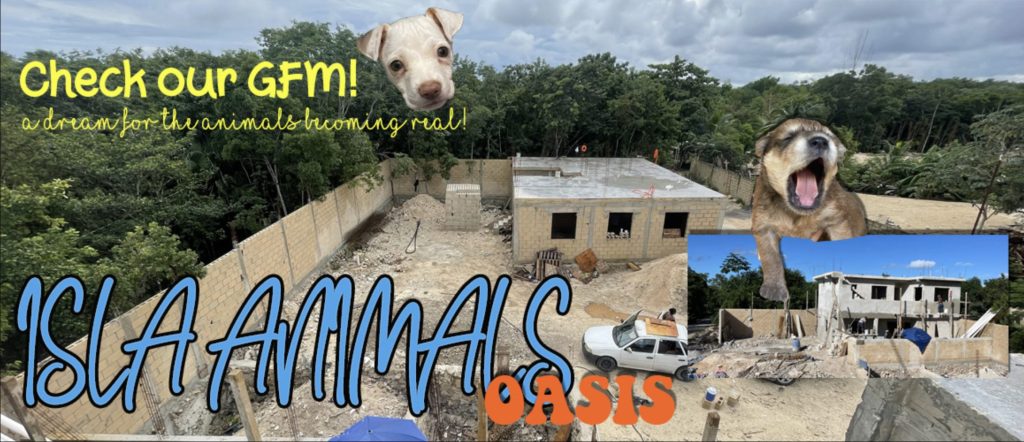
Progress on the new clinic – Isla Animals

McCormick Place is lethal to migrating birds
Animals Today July 31, 2023. Negative consequences of dog breed stereotypes. Dogs rescued from the Yulin meat festival flown to their new lives. Names of groups of animals.
Lori begins the show by taking on the still controversial topic of laws and regulations aimed at specific dog breeds, generally referred to as breed specific legislation. There are hundreds of such laws and regulations on the books across the US, which regulate or ban certain dog breeds. Breed specific legislation (BSL) typically targets pit bull type dogs. Those in favor of BSL say it’s necessary to ensure the public’s safety and argue that such legislation protects citizens from vicious and dangerous dogs.
Lori goes on to explain how the assumptions inherent in these types of laws are faulty and discriminatory and outlines the negative consequences that flow from them. A primary problem with breed specific bans or restrictions is that they rely upon the visual appearance and physical traits of a dog to designate them as a certain breed. But numerous studies have shown that one can’t reliably determine the breed or mix of breeds of a dog based upon the visual appearances. Only DNA testing is able to accurately determine the genetic makeup of a dog.
Also, the laws do not take into account the actual behavior of individual dogs. And there is new research showing that the dog’s breed is not a good predictor of the dog’s behavior. It is the experiences of the dog, the environmental factors and the training that are most responsible for the individual characteristics of a dog.
Moreover, we now know that legislation that restricts dogs based on appearance does not reduce dog bites or dog attacks in communities where the laws are in effect. And of course, the existence of these very laws, however misguided and ineffective, reinforce the beliefs that certain dog breeds are just too risky to be around, because they are inherently dangerous.
As a consequence, more of these dogs populate shelters, they are euthanized at high rates, and they become less frequently adopted by the public at large. They are stigmatized and the taint is pervasive. And the downstream effects of stigmatizing dogs (pit bulls especially) are broad, including restrictions placed upon renters by landlords, regulations and limitations placed by homeowner’s associations, limitations on homeowners’ insurability, and so on.
In certain restrictive jurisdictions, one might even be forced to relinquish or give away one’s dog.
So, experts now agree that breed specific legislation and similar policies that restrict dogs based on appearance do not reduce dog bites in communities or enhance public safety. And finally, there is a gradual but slow-moving trend to easing some of the laws and restrictions related to breed discrimination, as the science is more clear than ever against any rationale for restricting or banning dogs based on their appearance.
Lori calls for revocation of laws and regulations against dogs based on breeds, and emphasizes that if the goal is to reduce dog bites and dog attacks in our communities, perhaps funds and resources would be best used on education and on regulation that targets irresponsible dog owners, dog breeders and animal abusers.
Then Peter welcomes Lori Kalef Director of Programs at SPCA International to speak about China’s Yulin dog meat festival and the successful rescue of 21 dogs from certain death. This long running annual event attracts many international visitors, during which an estimated 10,000 dogs are slaughtered and consumed. US based China Rescue Dogs, Partnering with SPCA international coordinated the effort, with vital assistance of rescue groups and dedicated animals lovers in China and stateside to give a few of the lucky dogs what they all deserve: and safe, happy life as our treasured companions.
Kalef details the logistical challenges that were met, the teamwork and coordination employed by a small army of volunteers, organizations, and financial supporters. SPCA International funded the freedom airline flight with a $50,000 Shelter Support grant to China Rescue Dogs. Despite public outcry, the controversial festival continues its horrific practices of torture. Kalef expects this small group of saved dogs will continue to bring greater attention to China’s awful practice, ultimately helping to bring about its end.
To conclude, there are many colorful and descriptive names designating a group of a particular type of animal. You could call a group of geese a gaggle, a bunch of kangaroos a mob, but how about some porcupines?? Test yourself and have fun!

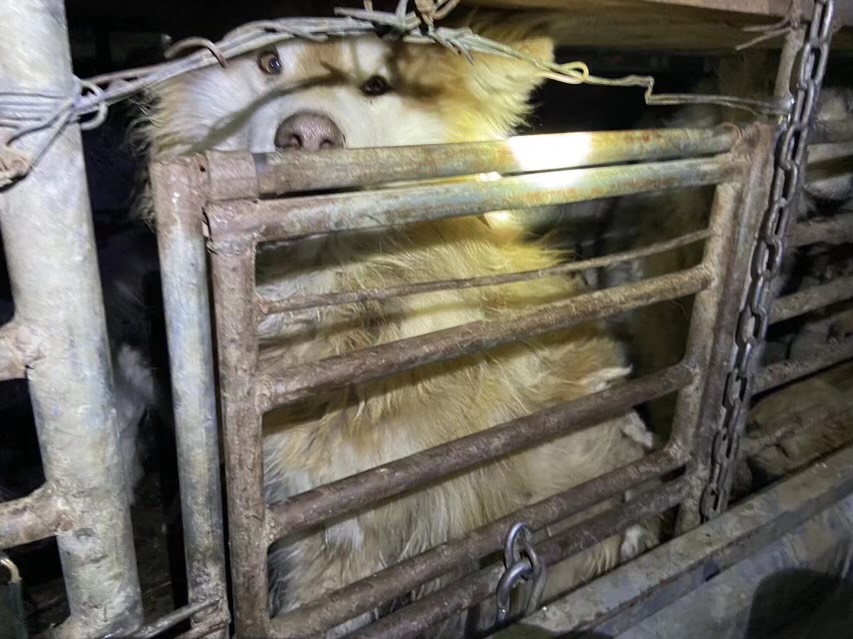

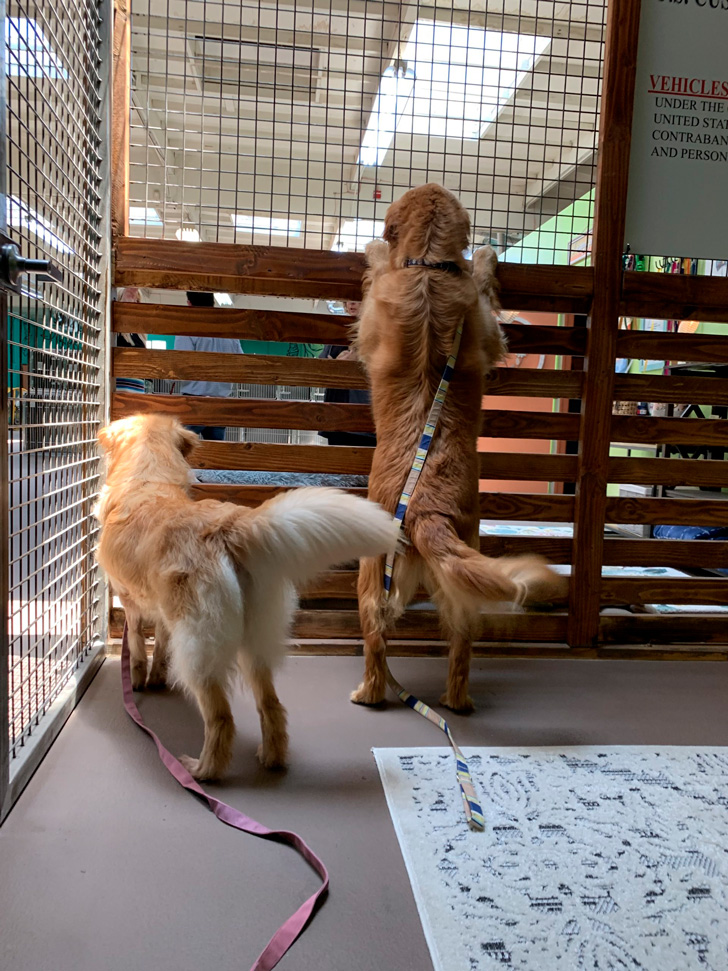
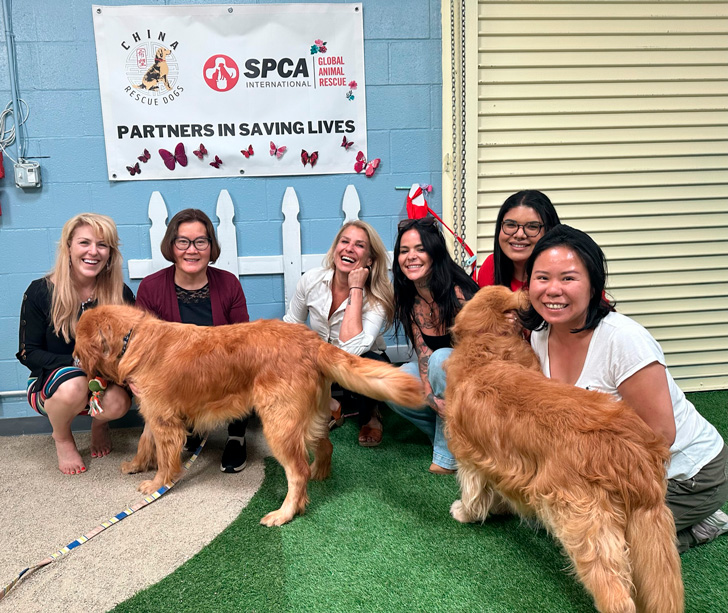
Animals Today June 24, 2023. Hot news update! Giraffe conservation facts and challenges. What defines a dangerous or vicious dog? Tough question!
Peter begins with an animal news round-up including giraffe conservation, why people must not approach wild animals in national parks or anywhere, imagining a world teeming with T. rexes, mad cow madness and the continuing tragedy of horse racing.
Lori then continues the giraffe theme with facts and queries about these magnificent, gentle beings. June 21 was World Giraffe Day!
Then, did you know that two states, Virginia and California, now have laws requiring shelters and rescue group which adopt out dogs, to share the dogs’ “bite history” if known, to the potential adopters? Lori believes that in principle, such laws are a good idea because more information about the dogs’ history should lead to better matches between adopters and dogs. However, determining the true and complete history of dogs’ prior lives can be near impossible. And, saying a dog has bitten in the past automatically stigmatizes the dog in the eyes of many, even though the circumstances surrounding the alleged incident are unknown. For instance, if a child pulls the tail of dog, frightening the animal, who then spins around and nips the child, can the dog be blamed? Another regrettable phenomenon is the imprecise use of the word vicious. A dog who has bitten is often wrongly called a vicious dog, which lessens the dogs’ prospects for adoption, and raises its chances of being euthanized. So, whether and how to provide histories to potential adopters is a complex issue. For now the best we can do is to remind or educate adopters that they need to be realistic and adaptable. There is a little story, apropos here, where a woman asks her Vet, “Is there any chance my dog will bite?” The Vet replies, “Does he have teeth?”

Nubian giraffe. Photo: Giraffe Conservation Foundation.
Animals Today January 15, 2023. History of the animal rights movement. Pet care coverage in case of emergency at home. Please don’t adopt or buy a wolfdog. The Beatles had many songs about animals. Vertebral disc disease with a veterinary neurologist.
Lori begins with something any animal advocate ought to know about: the history of the animal rights and welfare movements. From the practices of ancient spiritual teachers of India, to the ideas of modern philosophers, Lori hopes this condensed history will inspire you to continue learning on your own.
Next, do you have a plan in place if you cannot make it home because of an emergency? Lori’s unexpected hospitalization while Peter was away presented such a situation, and fortunately, our trusted neighbors were prepared to step in and take care of the dogs and cats. So get your plan in place, especially if you still have an appendix!
Then Darlene Kobobel, President of the Colorado Wolf and Wildlife Center returns to discuss the many problems related to wolf-dog hybrids, properly called wolfdogs. You will want to think twice before buying one!
And, who doesn’t like the music of the Beatles? Lori offers up a bit of much needed levity, with a fun quiz about Beatles songs with animals in their titles. Next, in recognition of International Cheetah Day, Lori tells us all about these majestic and athletic big cats. As expected, their numbers in the wild in Africa are shrinking, from about 100,000 individuals in 1900 to 9,000 – 12,000 now.
To conclude, Stephen Hanson, DVM joins Lori to discuss veterinary neurology and vertebral disc disease in dogs. Our dog, Susie was his patient.

Animals Today April 2, 2022: Ukraine war update from Paws of War. The cruelty continues at Alaska’s infamous sled dog race. More animal adaptations.
Lori begins with an update on the situation in Ukraine and the war region with Robert Misseri, founder and President of Paws of War. The situation Robert describes is very fraught, with starving and terrified animals roaming and hiding, worsened by severe hindrances to relief efforts due to the ever-present danger. Sometimes, dumping bags of dog food onto the ground for the dogs is all that relief workers can do.
Then, the Iditarod Trail Sled Dog Race has just marked its 50th anniversary. Yes, it continues despite strong efforts by many groups and individuals to shut down this profoundly cruel yearly event. The contest is a 1100 mile long race from Anchorage to Nome, Alaska. The teams racing in the Iditarod consist of one human driver of the sled (musher) and 12-16 dogs who are connected to the sled by a series of lines. These dogs are forced to run beyond exhaustion over 8-16 days on grueling terrain, with jagged rocks, high winds, dense forest and subzero temperatures. They can develop lung and kidney damage, stomach ulcers, hypothermia, frostbite, bone fractures, shoulder injuries and often sustain tendon tears. Dogs can get injured or killed by getting tangled in the lines. This year, conditions were especially stormy and cold. According to PETA, two dogs went missing, and nearly 250 were pulled off the trail due to exhaustion, illness or injury. Before the race even started, dogs were attacked and one was killed during training. Also, the Anchorage Daily News reported that 3 mushers were penalized for the rule-breaking act of allowing dogs to escape the brutal story and cold conditions by allowing them to spend the night in their shelters. Lori recommends the 2016 film, “Sled Dogs” for a behind the scenes look at this cruel race including the culture and businesses that sustain it. Also, visit Sled Dog Action Coalition for extensive information about the race and its cruelty. Due to the widespread criticism of the event, corporate sponsorship is decreasing. Let’s hope this portends the end of this very cruel event.
Lori then continues sharing some amazing physical adaptations possessed by some creatures including the Alaskan wood frog, which can freeze and thaw to survive the winter, the innocuous looking stonefish, which can kill with its highly potent venom, the extreme bite strength of the Tasmanian devil, the javelina, which happily ingests spine covered prickly pear cactus pads, and more
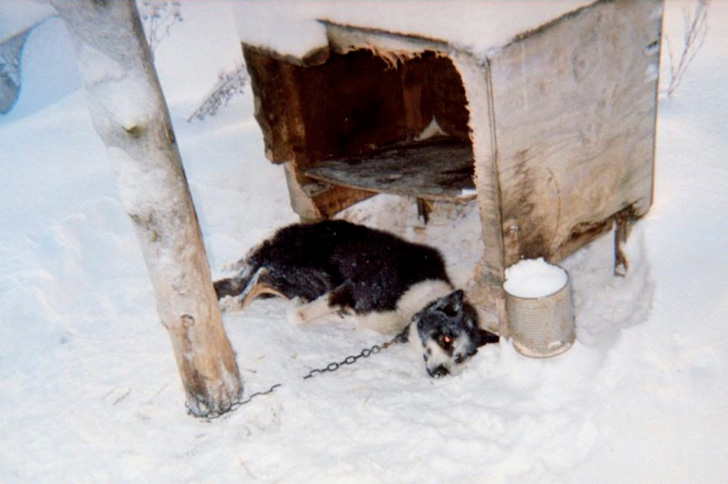
Animals Today Feb 20, 2022. Support the FDA Modernization Act! What can and should shelters disclose about the history of their adoptable dogs?
We begin speaking with Wayne Pacelle about pending legislation in both the House and Senate, the FDA Modernization Act, which would eliminate the animal testing mandate for development and approval of new pharmaceutical drugs for human use.
Mr. Pacelle, as President of Center for a Humane Economy, Founder of Animal Wellness Action, and CEO of Animal Wellness Foundation, as well as former CEO of The Humane Society of the United States, is diligently working to garner support for these bills. He is arguably the county’s most effective lobbyist for animal welfare laws in the US.
Under the current regulations, in the 83 year old the Federal Food Drug and Cosmetics Act (FFDCA), the FDA requires testing on animals as part of the requirements to get a new drug approved for use in humans. This is clearly outdated and antiquated for many reasons including that testing on animals often does not produce results applicable to humans. Consequently, potentially useful drugs never make it to human use (due to the drugs failing animal testing), and other drugs go on to harm and kill people after having been deemed safe in animal tests. Furthermore, when animal testing is utilized, drug development costs are raised, contributing to the high prices of new prescription drugs. And of course, the incredible scope of animal cruelty in these tests is well documented. So, at long last, there is a real opportunity to modernize the way drugs get developed and approved and now is the time for all of us to take action!
First, read more about the bills at Center for a Humane Economy. Then contact both of your US senators and your house member and urge them to support the FDA modernization Act! The Senate bill is S. 2952, and the House bill is H.R. 2565. Write, call, email or fill out the form linked here which makes it quick and easy – and share it widely, too.
Then, did you know that 2 states, Virginia and California, now have laws requiring shelters and rescue group which adopt out dogs, to share the dogs’ “bite history” if known, to the potential adopters? Lori believes that in principle, such laws are a good idea because more information about the dogs’ history should lead to better matches between adopters and dogs. However, determining the true and complete history of dogs’ prior lives can be near impossible. And, saying a dog has bitten in the past automatically stigmatizes the dog in the eyes of many, even though the circumstances surrounding the alleged incident are unknown. For instance, if a child pulls the tail of dog, frightening the animal, who then spins around and nips the child, can the dog be blamed? Another regrettable phenomenon is the imprecise use of the word vicious. A dog who has bitten is often wrongly called a vicious dog, which lessens the dogs’ prospects for adoption, and raises its chances of being euthanized.
So, whether and how to provide histories to potential adopters is a complex issue. For now the best we can do is to remind or educate adopters that they need to be realistic and adaptable.
There is a little story, apropos here, where a woman asks her Vet, “Is there any chance my dog will bite?” The Vet replies, “Does he have teeth?”

Animals Today August 17, 2019: Finding shelter and homes for ALL animals
Lori welcomes two special guests on this show:
- Inga Fricke, Director of Shelter Initiatives and Outreach for the Humane Society of the United States.
- Holly Sizemore, Chief Mission Officer, Best Friends Animal Society.
Finding shelter and homes for ALL animals
Over the past few decades, we have made great strides in reducing the number of healthy, adoptable dogs and cats “euthanized” in shelters. But we still have not reached our goal where each and every homeless animal becomes part of a loving family. Lori asks Inga and Holly to reflect on the admirable progress we have made, and what the biggest challenges and roadblocks remain in reaching this goal. Will we get there? Our experts say yes, and soon!
Please enjoy and share this special broadcast of Animals Today.

For more content on these topics, visit www.animalstodayradio.com
for News and Updates!

